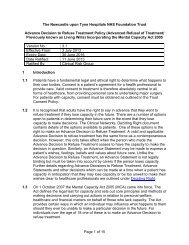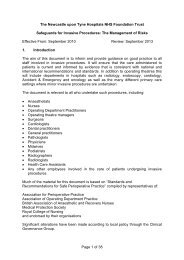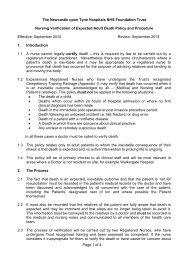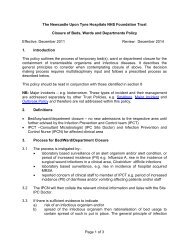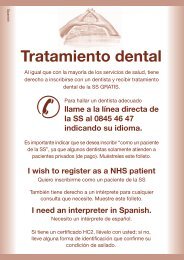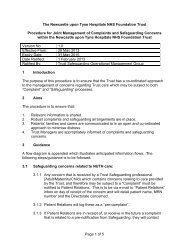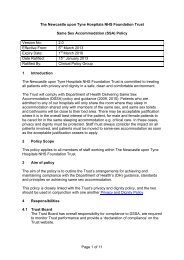New Staff Induction Policy (114KB pdf) - Newcastle Hospitals
New Staff Induction Policy (114KB pdf) - Newcastle Hospitals
New Staff Induction Policy (114KB pdf) - Newcastle Hospitals
You also want an ePaper? Increase the reach of your titles
YUMPU automatically turns print PDFs into web optimized ePapers that Google loves.
The <strong>New</strong>castle upon Tyne <strong>Hospitals</strong> NHS Foundation Trust<br />
<strong>New</strong> <strong>Staff</strong> <strong>Induction</strong> <strong>Policy</strong><br />
Effective: March 2007 Review date: March 2010<br />
1. Introduction<br />
1.1 The Trust places great importance on the induction of new employees and<br />
is committed to supporting new members of staff whilst they orientate<br />
themselves within the organisation and their workplace. It is important that<br />
line managers and supervisors recognise the importance of induction and<br />
the consequences of poor or no induction upon the individual and the<br />
organisation.<br />
1.2 An effective induction process provides a variety of benefits for both the<br />
employee and the Trust, emphasising key issues relating to high quality<br />
patient care and the efficient delivery of services.<br />
1.3 This policy details the contents and attendance procedure of corporate,<br />
departmental and locum induction. It also demonstrates how attendance<br />
is monitored and how non-attendance is followed up.<br />
1.4 This policy should be read in conjunction with Study Leave and Official<br />
Duty policy.<br />
2. Scope<br />
2.1 This policy is applicable to all newly recruited permanent and temporary,<br />
including clerical agency staff, staff contracted within the Trust.<br />
3. Roles and Responsibilities<br />
3.1 Head of Human Resources<br />
To ensure that the provision of Corporate and Departmental <strong>Induction</strong> for<br />
all staff is accessible to provide staff with current and reliable information<br />
to meet internal and external standards for newly recruited staff.<br />
3.2 Head of Training and Development<br />
To ensure that a robust Corporate <strong>Induction</strong> Programme is in place to<br />
accommodate all new staff and that accurate records are maintained<br />
relating to Corporate and Departmental <strong>Induction</strong>.<br />
3.3 Education Centre<br />
To ensure that a robust Corporate <strong>Induction</strong> Programme is in place to<br />
accommodate all new junior medical staff and accurate records are<br />
maintained.<br />
Page 1 of 14
3.4 Directorate/Department Manager/Clinical Director<br />
To ensure staff are allocated protected time to complete Corporate and<br />
Departmental <strong>Induction</strong> Programmes within the given timescale.<br />
3.5 Lead <strong>Induction</strong> Officer<br />
To co-ordinate the Corporate <strong>Induction</strong> Programme for all newly recruited<br />
staff, ensuring that key issues are covered through an innovative agenda<br />
which reflects current Trust policies and procedures.<br />
To monitor Departmental <strong>Induction</strong> records (ref 5.2).<br />
3.6 All <strong>Staff</strong><br />
All new staff, regardless of grade or profession, must attend the corporate<br />
induction. The term new staff is defined as those employees who have<br />
either never worked for the <strong>New</strong>castle Upon Tyne <strong>Hospitals</strong> NHS<br />
Foundation Trust or who have had a break in service of more than 12<br />
months.<br />
4. Corporate <strong>Induction</strong><br />
4.1 The corporate induction programme provides mandatory training in key<br />
generic areas. See Appendix 2.<br />
4.2 As an integral part of the recruitment process, the HR, Medical<br />
<strong>Staff</strong>ing and Nurse Bank departments will reserve a place on the induction<br />
programme for all new staff, with the exception of junior medical staff<br />
(ref 4.4).<br />
4.3 The employee and their manager/Clinical Director will be notified of their<br />
induction course date in advance. Attendance at Corporate <strong>Induction</strong> will<br />
normally take place within 4 weeks of commencing employment with the<br />
Trust. Managers/Clinical Directors must ensure that arrangements are<br />
made to allow employees to attend on the allocated day.<br />
4.4 The Education Centre organises induction programmes for ‘junior’ medical<br />
staff, which includes <strong>Staff</strong> Grade, Associate Specialist, Clinical Assistants,<br />
Hospital Practitioners and Foundation Doctors, and in conjunction with the<br />
Medical <strong>Staff</strong>ing department, will arrange a place on the relevant induction<br />
programme. See Appendix 4.<br />
4.5 Those medical staff (Specialist Registrars) commencing employment in<br />
the Trust, outside the scheduled bi-annual dates (ie. February and August)<br />
are inducted through a combination of completing a comprehensive local<br />
induction programme, and e-learning induction programme.<br />
4.6 All new staff attending Corporate Trust <strong>Induction</strong> will receive a <strong>Staff</strong><br />
Handbook on the day.<br />
Page 2 of 14
5. Departmental <strong>Induction</strong><br />
5.1 All new permanent and temporary staff, regardless of grade or profession,<br />
and including administration and clerical agency staff, must complete an<br />
induction to their Directorate or Department. A Departmental <strong>Induction</strong><br />
template is available on the Intranet in the Training and Development<br />
section. The content of this may be expanded, as relevant to local<br />
induction standards. See Appendix 1 for A&C agency staff induction<br />
record; Appendix 3a for other permanent/temporary staff.<br />
5.2 All managers are required to complete the departmental induction record<br />
within 3 months of employee’s employment date. The form is available on<br />
the intranet in the Training and Development section. On completion, this<br />
must be returned directly to the Training department to ensure that central<br />
records are accurately maintained. See Appendix 3b.<br />
5.3 The return of departmental records will be closely monitored by the lead<br />
<strong>Induction</strong> Officer with quarterly exception reports provided to<br />
Managers/Clinical Directors.<br />
5.4 Local induction training for junior medical staff is the responsibility of the<br />
Named Responsible Person (of Medical Consultant level) for each<br />
speciality. This person is also responsible to ensure accurate records of<br />
completed induction are maintained. The department maintain records of<br />
completed local inductions, and must return a copy of this record to the<br />
Education Centre. See Appendix 5.<br />
6. Locum <strong>Induction</strong><br />
6.1 Each Directorate is required to have a “locum pack” providing an outline of<br />
the work of the speciality, the chain of command, the location of the key<br />
departments, communication systems and emergency/ resuscitation<br />
arrangements.<br />
6.2 Mandatory training to include fire safety, moving and handling,<br />
cardiopulmonary resuscitation, and blood transfusion is the responsibility<br />
of the individual through their employing agency.<br />
7. Attendance at Corporate <strong>Induction</strong><br />
7.1 The Trust recruitment process includes the allocation of places on the<br />
corporate induction programme (ref 4.2). All staff are expected to attend<br />
their allocated place. Should the original date not be suitable eg. due to<br />
coinciding with existing planned absences, then the lead <strong>Induction</strong> Officer<br />
must be notified; an alternative date will be offered to the employee by the<br />
lead <strong>Induction</strong> Officer. The new date will be within one month of that<br />
originally allocated.<br />
7.2 Attendance at all corporate induction programmes is monitored by the lead<br />
<strong>Induction</strong> Officer through a central register completed by all attendees.<br />
The Training department maintains the attendance records for all<br />
Consultant and senior-level medical staff and all non-medical staff.<br />
7.3 The attendance records for all other medical staff are maintained by the<br />
Education Centre.<br />
Page 3 of 14
7.4 Failure to attend on the allocated date for induction will result in the<br />
manager/Clinical Director being contacted in writing to establish the cause<br />
of non-attendance. Non-attendance will be classed as unauthorised<br />
absence unless the employee has reported their absence in line with Trust<br />
policy or notified their manager and has made alternative arrangements.<br />
7.5 Managers are responsible for monitoring their newly recruited staff who<br />
have failed to attend to ensure that alternative dates are arranged and<br />
attended.<br />
7.6 Non-attendance at the junior medical staff induction in August and<br />
February is followed up by the Education Centre with the educational<br />
leads. If a junior doctor does not attend the induction, they must<br />
undertake the on-line package within one month of commencing<br />
employment.<br />
7.7 Completion of this will be monitored by the Education Centre.<br />
8. Monitoring and Review<br />
8.1 The Head of Training and Development will monitor attendance at Corporate<br />
<strong>Induction</strong>, providing quarterly reports to the Trust Education Group.<br />
8.2 The Corporate <strong>Induction</strong> Programme content will be reviewed by the lead<br />
<strong>Induction</strong> Officer as an on-going process, to ensure information provided<br />
to staff is current and relevant.<br />
8.3 To help assess the effectiveness of Corporate <strong>Induction</strong>, attendees are<br />
requested to complete an evaluation form. Any constructive comments<br />
and suggestions are used to improve the quality of the programme.<br />
8.4 The <strong>Staff</strong> Handbook will be reviewed by the lead <strong>Induction</strong> Officer prior to<br />
each print run to ensure that the content remains current and accurate.<br />
<strong>Policy</strong> Review<br />
The Human Resources Manager is responsible for the review and amendment of this policy.<br />
Page 4 of 14
THE NEWCASTLE UPON TYNE HOSPITALS NHS FOUNDATION TRUST<br />
Appendix 1<br />
A&C AGENCY WORKERS –<br />
GENERAL INDUCTION CHECKLIST<br />
Agency Worker Name: ______________________________________________________________<br />
Agency: ________________________________<br />
Job Title: __________________________________________________________<br />
Date of Commencement: ______________________________<br />
Ward/Dept: _______________________________________________ Directorate: ____________________________________________________<br />
To be completed by the Dept Head/Supervisor and agency worker<br />
No. Description Date<br />
Completed<br />
Signed by Agency Worker<br />
& Manager<br />
1. Before employee starts<br />
1.1 Arrange to meet person at an agreed time and venue<br />
1.2 Arrange for appropriate computer network and other systems access (if necessary)<br />
1.3 Establish a timetable for induction with appropriate colleagues and managers<br />
1.4 Ensure there are appropriate accommodation arrangements in place, including telephone, locker,<br />
etc<br />
1.5 Book on Trust <strong>Induction</strong> Programme (long term placements only)<br />
2. On First Day<br />
2.1 Meet and greet at agreed time and venue<br />
2.2 Go through duties and responsibilites including: job description; departmental organisation chart;<br />
hours of work; issue ‘Important Information’ document<br />
2.3 Establish if office keys are required (and arrange if necessary)<br />
2.4 Inform how/when the staff ID badge can be obtained and its importance
2.5 General introductions to relevant staff<br />
2.6 Introduce to line manager.<br />
2.7 Establish a mentor who can deal with non-work related queries for the first couple of days/weeks.<br />
2.8 Go through fire alarm procedure<br />
2.9 Go through First Aid procedure including role of ‘Appointed Person’ and Occupational Health.<br />
2.10 Show location of work station.<br />
2.11 Show round immediate area of work to familiarise and show other relevant areas/departments on or<br />
off-site<br />
2.12 Show location of toilets.<br />
2.13 Show location of rest room and restaurant/shops.<br />
2.14 Show how to use telephone system.<br />
2.15 Show how to use PC and access Trust’s network, Intranet and Internet.<br />
2.16 Explain ‘Do’s and Don’ts’ of Intranet and Internet use.<br />
2.17 Complete H&S Checklist<br />
2.18 Explain Incident/Accident reporting procedure.<br />
2.19 Explain the following:<br />
• Confidentiality (Confidentiality Statement - signed copy held by Agency)<br />
• Smoke Free Zone<br />
• Dress Code<br />
• Private telephone calls and use of mobiles<br />
• Reporting of sickness absence and/or non-attendance<br />
• Timekeeping<br />
• General standards of behaviour and conduct expected<br />
• Car parking<br />
• Communications (including staff notice boards)<br />
• Hopper bus<br />
• Records management<br />
• Whistleblowing policy<br />
• Corporate Governance<br />
• Saving money
Appendix 2<br />
The <strong>New</strong>castle upon Tyne <strong>Hospitals</strong><br />
NHS Foundation Trust<br />
Morning<br />
INDUCTION PROGRAMME<br />
8.30 – 8.40 Registration & Introduction<br />
Speaker: Tracy Charlton – Ext 37510<br />
8.40 – 8.45 Welcome & Trust Overview<br />
8.45 – 9.20 About You<br />
<strong>Staff</strong> Services/Benefits; Hopper Service; Library, Occupational<br />
Health;<br />
Training; Human Resources; Security<br />
9.20 – 9.40 About the Trust<br />
Information Technology<br />
Speaker: Stephen Smith - Ext 37369<br />
9.40 – 10.00 Clinical Governance & Risk Management<br />
Speaker: Ian Warren – Ext 20452<br />
10.00 – 10.15 Tea/Coffee Break<br />
10.15 - 10.45 Privacy & Dignity; Customer Care; Equality & Diversity; Complaints<br />
10.45 – 11.00 About Your Work<br />
Chaplaincy<br />
Speaker: Nigel Goodfellow – Ext 48180<br />
11.00 – 11.45 Health & Safety<br />
Speaker: Health & Safety Advisor - Ext 48084/26205<br />
11.45 – 12.15 Child Protection<br />
Speaker: Janice Clarke - Ext 29150<br />
Afternoon<br />
12.15 - 1.00 Lunch<br />
1.00 – 1.45 Fire Safety<br />
Speaker: Arthur Perkins – Ext 23703<br />
1.45 – 2.30 Infection Control<br />
Speaker: Alison Sykes – Ext 24477<br />
2.30 – 2.45 Resuscitation<br />
Speaker: Simon Warne - Ext 48070
2.45 – 3.00 Tea/Coffee Break<br />
3.00 – 3.45 Moving & Handling<br />
Speaker: Jennifer Pye - Ext 25391<br />
3.45 – 4.00 Food Hygiene<br />
Speaker: Kevin Potts – Ext 48090<br />
4.00 – 4.30 Blood Transfusion<br />
Speaker: Susan Whitehead – Ext 48852<br />
4.30 Evaluation and Close<br />
<strong>Induction</strong> Programme contributes to the Knowledge & Skills Framework Core<br />
dimensions
Appendix 3a<br />
<strong>New</strong>castle upon Tyne <strong>Hospitals</strong><br />
NHS Foundation Trust<br />
EMPLOYEE DEPARTMENTAL INDUCTION RECORD<br />
Name:<br />
Job Title:<br />
Department/Ward:<br />
Start Date:<br />
Completion Date:<br />
Manager/Supervisor:<br />
…………………………………………………………<br />
…………………………………………………………<br />
…………………………………………………………<br />
…………………………………………………………<br />
…………………………………………………………<br />
…………………………………………………………<br />
Please complete the sections on the following pages of this form where applicable.<br />
On completion, please sign and return this page within 4 weeks of employee’s<br />
start date to:<br />
Tracy Charlton, Training Department, Cheviot Court 3, Freeman Hospital<br />
I am satisfied that the employee named above has received all the departmental<br />
induction training required for their role.<br />
Manager/Supervisor Signature: ……………………………………….………….<br />
Date: ……………………….………………………………………………………….
Appendix 3b<br />
Departmental Orientation<br />
Department structure explained<br />
Introduced to key staff members<br />
Role of employee explained<br />
ID Badge issued<br />
Locker & personal property arrangements explained<br />
Telephone systems demonstrated and explained<br />
Break arrangements explained<br />
Shown location of staff facilities, examples as follows::<br />
<strong>Staff</strong> toilets<br />
Beverage bay<br />
Restaurant<br />
Public Phone<br />
First aid facilities<br />
Notice boards<br />
Standards of Conduct<br />
Dress code policy explained<br />
Acceptable standards of behaviour explained<br />
Timekeeping and rotas explained<br />
Confidentiality issued discussed<br />
Uniform and laundry arrangements explained<br />
Procedure for personal telephone calls explained<br />
Trade Union arrangements discussed<br />
Fire Safety<br />
Shown location of fire extinguishers<br />
Shown location of fire panel<br />
Action to be taken on hearing fire alarm explained<br />
Action to be taken on discovering a fire<br />
Shown location of assembly point<br />
Evacuation procedure explained<br />
Security<br />
Given security contact number<br />
Explained how to report an incident and location of incident<br />
reporting forms<br />
Data Protection Act & responsibilities explained<br />
Patient’s property policy explained<br />
Missing patient’s policy explained<br />
Please tick<br />
box<br />
Please tick<br />
box<br />
Please tick<br />
box<br />
Please tick<br />
box<br />
Employee’s signature<br />
……………………………………....................................
Manager/Supervisor’s signature……………………………………………………..<br />
Cardiac Arrest<br />
Shown location of emergency equipment<br />
Shown how to check emergency equipment<br />
Procedure for summoning Arrest Team explained<br />
Can initiate basic life support (if appropriate to role)<br />
Can assist Arrest Team (if appropriate to role)<br />
Trust Resuscitation Training attended (if appropriate to role)<br />
Please<br />
tick<br />
box<br />
Department Health & Safety<br />
Shown how to access Health & Safety Intranet site<br />
Given copy of Health & Safety booklet (from intranet)<br />
Departmental Health & Safety policies explained<br />
Local Health & Safety hazards explained<br />
Personal protective equipment explained<br />
COSHH Guidelines explained<br />
Please<br />
tick<br />
box<br />
Moving & Handling<br />
Department specific risks identified<br />
Safe systems of work on ward/department explained<br />
Shown M&H equipment location<br />
M&H policy explained<br />
Please<br />
tick<br />
box<br />
Food Hygiene<br />
(if applicable to job role)<br />
Use of microwave explained<br />
Food storage explained<br />
Food handling explained<br />
Food disposal explained<br />
Importance of food temperature explained<br />
Please<br />
tick<br />
box<br />
Employee’s signature<br />
……………………………….....................................<br />
Manager/Supervisor’s signature……………………………………………………
Waste Management<br />
(if applicable to job role)<br />
Shown procedures for the disposal of:<br />
Please<br />
tick<br />
box<br />
• Clinical waste<br />
• Non-clinical waste<br />
• Infectious waste<br />
• Body fluids<br />
• Sharps<br />
• Cytotoxic waste<br />
• Radioactive waste<br />
• Confidential waste<br />
Infection Control<br />
(if applicable to job role)<br />
Shown procedures for:<br />
• Accessing infection control policies from intranet<br />
• Practicing standard precautions<br />
• Practicing effective hand hygiene<br />
• Isolation practices<br />
• Management of MRSA positive patients<br />
• Disposal of used laundry<br />
Please<br />
tick<br />
box<br />
Personal Documentation<br />
Shown how to complete accident/incident reports<br />
Shown how to complete enhanced hours form<br />
Procedure for reporting absence explained<br />
Shown how to apply for annual leave<br />
Appraisal documentation and procedure explained (including KSF)<br />
Please<br />
tick<br />
box<br />
Employee’s signature<br />
…………………………………………............<br />
Manager/Supervisor’s signature<br />
…………………………………………………
DEPARTMENTAL SPECIFIC<br />
Subject<br />
Please tick<br />
box<br />
Employee’s signature<br />
…………………………………………............<br />
Manager/Supervisor’s signature<br />
…………………………………………………
Appendix 4<br />
Junior Medical <strong>Staff</strong> Trust <strong>Induction</strong> Programme<br />
Thursday 8 February 2007<br />
Lecture Theatre 1, Freeman Hospital Education Centre<br />
08:15 Registration Function Room<br />
09:00 Introduction to the Trust Mrs Alyson Williamson<br />
Medical Education<br />
Services Manager<br />
09:10 Fire Safety Briefing Mr Paddy McManus, Fire<br />
Officer<br />
09:25 Health and Safety Dru Parnaby, Health and<br />
Safety<br />
09:55 Clinical Tutor presentation<br />
Mr Jon Hanson<br />
Communication Study/Sick/Annual Leave Foundation Tutor<br />
Education Getting paid<br />
Clinical Waste<br />
Laboratories<br />
Transfusion Radiology<br />
Pharmacy Prescribing<br />
Clinical Governance Risk Management<br />
Record Keeping Incident Reporting<br />
Consent<br />
10:35 Coffee<br />
10:50 Paybanding, EWTD etc Richard Lancaster,<br />
EWTD Team<br />
11:10 IT Systems Mr Richard Oliver,<br />
IT Training Officer<br />
11:30 Introduction to PACS system Carole Dodd,<br />
NGH PACS Manager<br />
11:45 Introduction to Resuscitation Mrs Karen Rowell<br />
Resuscitation Training<br />
Officer<br />
12:45 Occupational Health Issues David Patterson<br />
Occupational Health<br />
01:00 Programme close


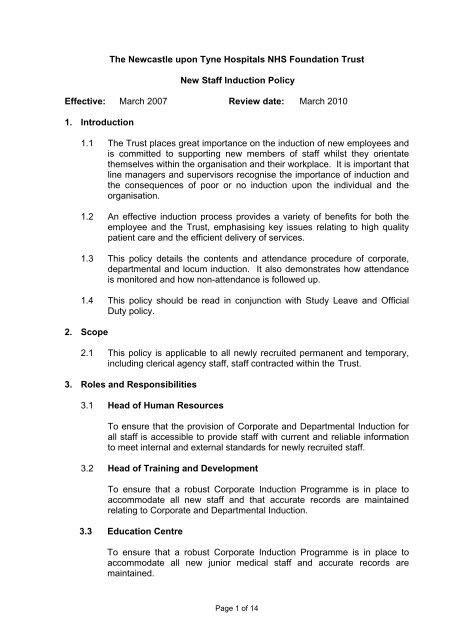
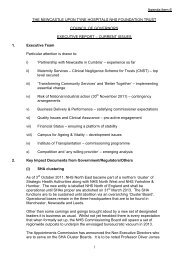
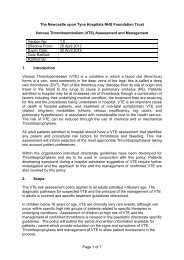
![Standard Precautions Policy - 112KB [PDF] - Newcastle Hospitals](https://img.yumpu.com/51150129/1/184x260/standard-precautions-policy-112kb-pdf-newcastle-hospitals.jpg?quality=85)
![Oxygen Management Policy - 38KB [PDF] - Newcastle Hospitals](https://img.yumpu.com/50798872/1/184x260/oxygen-management-policy-38kb-pdf-newcastle-hospitals.jpg?quality=85)
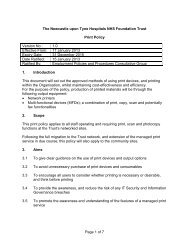
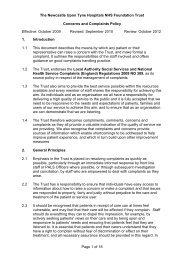
![Patient Identification Policy - 130KB [PDF] - Newcastle Hospitals](https://img.yumpu.com/49156101/1/190x245/patient-identification-policy-130kb-pdf-newcastle-hospitals.jpg?quality=85)
